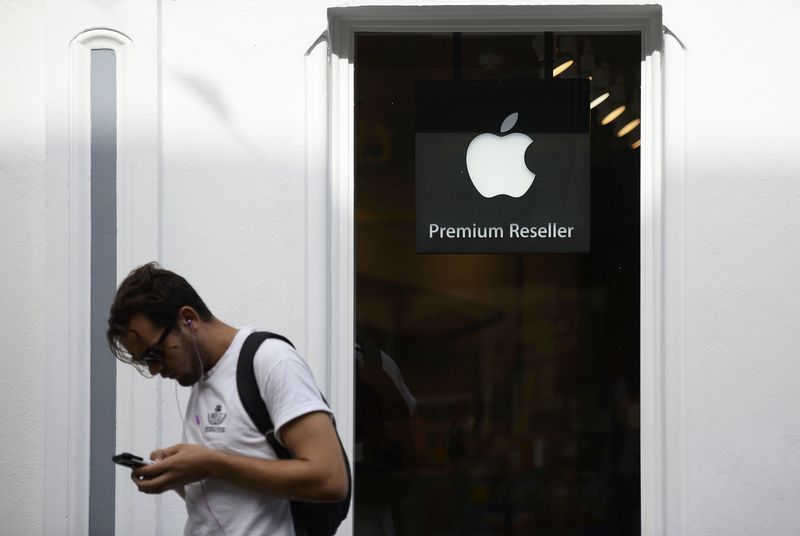* European shares open firmly in red; Frankfurt leads fallers
* Wall Street futures point to weak open
* Apple's Frankfurt shares down more than 8 pct
* Currency 'flash crash' sends yen soaring
By Andrew Galbraith and Josephine Mason
SHANGHAI/LONDON, Jan 3 (Reuters) - Apple's rare warning on revenue rocked financial markets on Thursday, reigniting concerns about slowing global economic and corporate growth and potential damage from Washington's protracted trade row with Beijing.
Asian and European shares fell sharply, led by a sell-off in technology stocks, and U.S. stock futures pointed to a weaker open on Wall Street, after Apple AAPL.O cut its revenue forecast, its first downgrade in nearly 12 years, blaming weaker iPhone sales in China. The news also jolted currency markets.
Apples shares tumbled in after-hours trade and those listed in Frankfurt AAPL.F were down 8.6 percent in early European deals. news sparked a 'flash crash' in holiday-thinned currency markets as growing concerns about the health of the global economy, particularly China, sent investors scurrying into the safe-haven of the Japanese currency. The yen was poised for its biggest daily rise in 20 months. FRX/
Apple's alert followed data earlier this week that showed a deceleration in factory activity in China and the euro zone, indicating the ongoing trade dispute between the United States and China was taking a toll on global manufacturing.
Major European bourses opened firmly in negative territory - Frankfurt's DAX .GDAXI , with its exposure to Chinese trade and tech-heavy constituents, was the biggest faller down as much as 0.8 percent, while Paris' CAC40 .FCHI dropped 0.7 and London .FTSE eased 0.2 percent.
Chipmakers who supply parts to Apple were the worst hit. Shares in AMS AMS.S , which provides the facial recognition sensors used in the latest iPhones, fell 19.4 percent to the bottom of the STOXX .STOXX .
U.S. stock futures pointed to another rough start on Wall Street, with Nasdaq E-mini futures NQc1 down 2.5 percent and S&P 500 E-mini futures ESc1 off 1.6 percent.
MSCI's broadest gauge of Asia-Pacific shares outside Japan .MIAPJ0000PUS fell 0.5 percent after an attempt in Asian hours at a bounce. Japanese markets were closed for holidays but Nikkei futures NKc1 dropped 1.8 percent.
Shares in China .CSI300 and Hong Kong .HSE see-sawed between gains and losses as investors waited for Beijing to roll out fresh support measures for the cooling Chinese economy. .SS
"Chinese authorities have got the luxury of having control not just of the fiscal parts of the government tool case, but also the monetary parts ... and I suspect the Chinese authorities will use that," said Jim McCafferty, head of equity research, Asia ex-Japan, at Nomura.
China's central bank said late on Wednesday it was adjusting policy to benefit more small firms that are having trouble obtaining financing, in its latest move to ease strains on the private sector, a key job creator.
While more fiscal and monetary policy support had been expected in coming months on top of modest measures last year, some analysts wonder if more forceful stimulus will be needed to stabilise the world's second-largest economy. surprise announcement weighed on tech shares across Asia, most notably in Taiwan and South Korea. An MSCI index of Korean shares .MIKR00000PUS lost 1.8 percent and Taiwan shares .MITW00000PUS fell 1.4 percent.
'FLASH CRASH'
Currency markets saw a wild spike in volatility in early Asian trade, with risk aversion pushing the yen sharply higher against the U.S. dollar, breaking key technical levels and triggering stop-loss sales of U.S. and Australian dollars. dollar was last 1 percent weaker against the yen JPY= at 107.77, having earlier fallen as low as 104.96, its lowest level since March 2018. The Australian dollar at one point hit levels against the Japanese yen not seen since 2011. AUDJPY=D3
The euro EUR= was up 0.3 percent, buying $1.1375, and the dollar index .DXY , which tracks the U.S. currency against a basket of major rivals, was 0.3 percent weaker at 96.52.
Amid the flight to perceived safety, German government bond yields held close to their lowest in over two years. Germany's 10-year bond yield was most recently at 0.169 percent, from a low of 0.148 percent on the day DE10YT=RR . GVD/EUR
U.S. crude CLc1 oil fell 1.8 percent to $45.71 a barrel, and Brent crude LCOc1 was down 1 percent at $54.34. Slowing global growth is expected to coincide with an increase in crude supply, depressing prices. O/R
Gold was higher as the dollar weakened, with spot gold XAU= trading up 0.3 percent at $1,289.4 per ounce. GOL/
<^^^^^^^^^^^^^^^^^^^^^^^^^^^^^^^^^^^^^^^^^^^^^^^^^^^^^^^^^^^ Currency Flash Crash
https://tmsnrt.rs/2RvrCQi
^^^^^^^^^^^^^^^^^^^^^^^^^^^^^^^^^^^^^^^^^^^^^^^^^^^^^^^^^^^>
